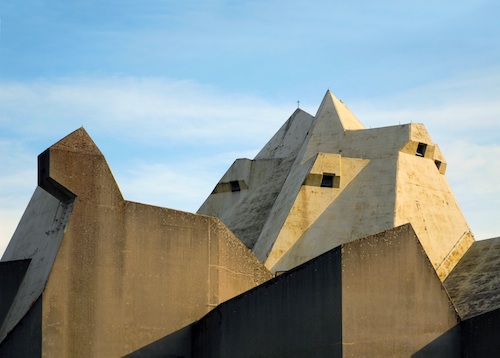By Joe Bendel. Pritzker Prize winner Gottfried Böhm and his three architect sons might be the world’s preeminent modernists, but the function of many of their buildings is to harken back to the past. With churches, mosques, World War II memorials, and an Egyptology museum to their collective credit, the Böhms have built, but they find themselves at a personal and professional crossroads in Maurizius Staerkle Drux’s documentary, Concrete Love: the Böhm Family, which screened during the 2015 Slamdance Film Festival in Park City.
As the only German Pritzker laureate, Gottfried Böhm is the unquestioned head of the clan and of their family practice. His overwhelmingly dominant stature leads to issues and tensions within the family unit, particularly with respect to his wife Elisabeth. She was once a promising junior architect as well, but she permanently deferred her career to raise their children. She has long suffered from dementia when Drux starts observing the family, but she soon succumbs to age and infirmity.
Despite her failing health, the Böhm sons miss their mother’s stabilizing influence. Resentments of the patriarch start to become more pronounced, especially as the sons face their own particular professional challenges. Stephan is determined to get a toehold in the exploding Chinese market, even though he is a bit put off to learn architects are largely considered on par with contractors and workmen in the People’s Republic (arguably, a rare expression of egalitarianism in the increasingly stratified nation). Meanwhile, Paul Böhm is growing exasperated with the budget cuts and aesthetically dubious demands imposed on him by the strange network of patrons behind his mega-mosque project. Believe it or not, we sort of get the sense he is being set up to be some kind of scapegoat.

At least Peter Böhm sort of gets the last laugh at the opening of the Museum of Egyptian Art he designed. He had clashed with his father over its deceptively simple, boxy layout. Yet, once Drux takes his cameras inside, we get a sense of how its imposing massiveness evokes the great monumental structures of ancient Egypt and how the surprisingly airy open spaces serve the exhibitions. It really has a cool sense of place.
Of course, the elder Böhm has plenty of striking buildings to his credit as well. Indeed, seeing the family’s greatest hits is one of the best parts of Concrete. To his credit, Drux has a good eye for both architecture and familial drama. In a case of good news-bad news, his approach is probably too detached to feel voyeuristic or intrusive. As a result though, the pace can be a bit leisurely at times, but the film is clearly intended for a cultured audience with a sustainable attention span. Respectfully recommended for those interested in post-war architecture, Concrete Love will likely screen at many art-focused and German language festivals over the coming year, following its North American premiere at this year’s Slamdance Film Festival.
LFM GRADE: B
Posted on February 6th, 2015 at 12:33pm.